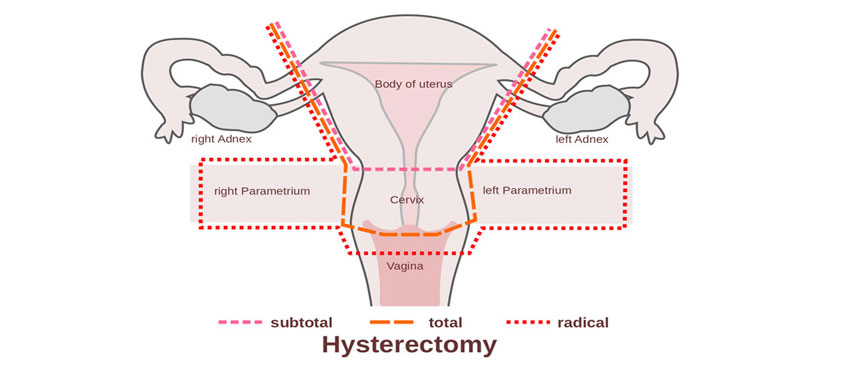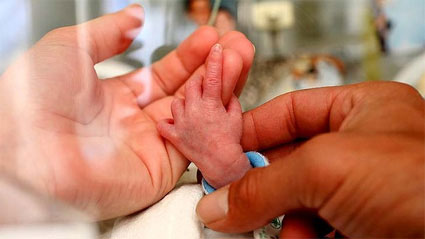Hysterectomy is a surgery done for the removal of the womb or the uterus due to various medical conditions. Read on to learn why it becomes necessary to remove the uterus and what precautions should be taken after the surgery. In this articleWhat is a hysterectomy?When is it necessary?What is the procedure?What are the implications?Which are the different types of hysterectomies?What are the risks associated with hysterectomy?What you can expect after hysterectomy surgery?How long does it take to recover from the surgery?What is a hysterectomy?A hysterectomy is an operation whereby the womb is surgically removed. There are various medical conditions which may make it necessary to remove it. When is it necessary?Some women require this operation when the womb (or uterus) is prolapsed, or there are certain pelvic infections that are not treatable. Some women suffer from heavy menstruation (dysfunctional uterine bleeding), and large painful and numerous fibroids for which a hysterectomy is the remedy. A hysterectomy is also done in the case of pelvic endometriosis (ectopic endometrium) or cancer or precancerous conditions of the womb or its mouth.In some cases, we need to remove the ovaries if they are diseased. If a young womans ovaries are diseased and they are removed, she will go into menopause. In such cases, Hormone Replacement Therapy (HRT) is advised.What is the procedure?There are basically two ways to perform a hysterectomy:Vaginal route, with or without repair of the vaginal and urinary bladder prolapsed.Abdominal route - when the uterus is enlarged or placed high.In select cases, we do a laparosocopy.What are the implications?A hysterectomy may have serious implications if it needs to be done before a woman has had children. In most cases, it spells freedom from heavy periods and from fears of cervical and uterine (womb) cancer.Which are the different types of hysterectomies?The hysterectomy that should be performed on you shall be decided by your doctor depending on the reason for surgery. In some cases he or she may choose to remove the entire or only parts of the uterus. It is important that you get it clarified if your ovaries or cervix or both are getting removed.In case of subtotal hysterectomy or supra cervical hysterectomy a surgeon removes the upper part of the uterus, keeping the cervix.In case of total hysterectomy your doctor shall remove the cervix as well as the uterus.In case of radical hysterectomy, your doctor shall remove the entire uterus, the cervix, uterus tissue sides or the upper part of the vagina. This is performed when the patient suffers from cancer.You may also have your ovaries removed by a process called oophorectomy.What are the risks associated with hysterectomy?It is a low risk surgery and thus you need not be worried much. There are no such reports of women going through any serious complications after undergoing the surgery. However, since possibilities of any risk factor cannot be ruled out completely, here is some useful information that you must keep in mind.Incontinence.Formation of fistula or abnormal association between the bladder and the vagina.Vaginal prolapse, a condition when a part of your vagina comes out.Chronic painSome other risk factors may include blood clots, infections from wound, haemorrhage, injury to the organs surrounding. However, these are not very common.What you can expect after hysterectomy surgery?Once the ovaries are removed in hysterectomy, the menstrual cycle shall come to an end. Even if the ovaries are not removed, you shall reach your menopause at an early age.Most of the women are known to feel good and think their operation has been successful. You shall be relieved from problems like heavy period or chronic pain.How long does it take to recover from the surgery?You do not have to wait long to get back to your normal course of life after going through a hysterectomy.You may take a bath and wash the area of incision with soap and water only when your doctor advises you to do so.If you feel itchy, you may use specially designed oils or creams in the area as prescribed by your doctor.If you have too many commitments, make sure to get back to them slowly.Lifting heavy weights and sexual intercourse must be strictly avoided after the surgery and at least for the next six weeks.Do not rush. Work only up to the point you think you are capable. You can get back to a completely normal life within six weeks.It is better to wait for two weeks before you start doing activities like driving.Do not let any chemicals or soap enter your vagina for at least four weeks.You can get back to light swimming two weeks after the surgery after consulting your doctor. However, you must not get into vigorous swimming four weeks after the procedure.You need to wait for about four to six weeks to be able to exercise again. Also, do not forget to take into account how you feel before exercising and seek approval of your doctor.It is very important that you take right care after hysterectomy surgery as per your doctor’s advice. If you feel any discomfort you must notify to your doctor immediately and follow the precautions as per your doctor’s advice to the ‘T’.Why is hysterectomy performed? What precautions should be taken after undergoing hysterectomy surgery? Are there any risks associated with hysterectomy surgery? Discuss here.
Hysterectomy is a surgery done for the removal of the womb or the uterus due to various medical conditions. Read on to learn why it becomes necessary to remove the uterus and what precautions should be taken after the surgery.What is a hysterectomy?
A hysterectomy is an operation whereby the womb is surgically removed. There are various medical conditions which may make it necessary to remove it.
When is it necessary?
Some women require this operation when the womb (or uterus) is prolapsed, or there are certain pelvic infections that are not treatable. Some women suffer from heavy menstruation (dysfunctional uterine bleeding), and large painful and numerous
fibroids for which a hysterectomy is the remedy. A hysterectomy is also done in the case of pelvic endometriosis (ectopic endometrium) or cancer or precancerous conditions of the womb or its mouth.
In some cases, we need to remove the ovaries if they are diseased. If a young woman's ovaries are diseased and they are removed, she will go into menopause. In such cases,
Hormone Replacement Therapy (HRT) is advised.
What is the procedure?
There are basically two ways to perform a
hysterectomy:
Vaginal route, with or without repair of the vaginal and urinary bladder prolapsed.
Abdominal route - when the uterus is enlarged or placed high.
In select cases, we do a laparosocopy.
What are the implications?
A hysterectomy may have serious implications if it needs to be done before a woman has had children. In most cases, it spells freedom from heavy periods and from fears of cervical and uterine (womb) cancer.
Which are the different types of hysterectomies?
The hysterectomy that should be performed on you shall be decided by your doctor depending on the reason for surgery. In some cases he or she may choose to remove the entire or only parts of the uterus. It is important that you get it clarified if your ovaries or cervix or both are getting removed.
- In case of subtotal hysterectomy or supra cervical hysterectomy a surgeon removes the upper part of the uterus, keeping the cervix.
- In case of total hysterectomy your doctor shall remove the cervix as well as the uterus.
- In case of radical hysterectomy, your doctor shall remove the entire uterus, the cervix, uterus tissue sides or the upper part of the vagina. This is performed when the patient suffers from cancer.
You may also have your ovaries removed by a process called oophorectomy.
What are the risks associated with hysterectomy?
It is a low risk surgery and thus you need not be worried much. There are no such reports of women going through any serious complications after undergoing the surgery. However, since possibilities of any risk factor cannot be ruled out completely, here is some useful information that you must keep in mind.
- Incontinence.
- Formation of fistula or abnormal association between the bladder and the vagina.
- Vaginal prolapse, a condition when a part of your vagina comes out.
- Chronic pain
Some other risk factors may include blood clots, infections from wound, haemorrhage, injury to the organs surrounding. However, these are not very common.
What you can expect after hysterectomy surgery?
Once the ovaries are removed in hysterectomy, the menstrual cycle shall come to an end. Even if the ovaries are not removed, you shall reach your
menopause at an early age.
Most of the women are known to feel good and think their operation has been successful. You shall be relieved from problems like heavy period or chronic pain.
How long does it take to recover from the surgery?
You do not have to wait long to get back to your normal course of life after going through a hysterectomy.
- You may take a bath and wash the area of incision with soap and water only when your doctor advises you to do so.
- If you feel itchy, you may use specially designed oils or creams in the area as prescribed by your doctor.
- If you have too many commitments, make sure to get back to them slowly.
- Lifting heavy weights and sexual intercourse must be strictly avoided after the surgery and at least for the next six weeks.
- Do not rush. Work only up to the point you think you are capable. You can get back to a completely normal life within six weeks.
- It is better to wait for two weeks before you start doing activities like driving.
- Do not let any chemicals or soap enter your vagina for at least four weeks.
- You can get back to light swimming two weeks after the surgery after consulting your doctor. However, you must not get into vigorous swimming four weeks after the procedure.
- You need to wait for about four to six weeks to be able to exercise again. Also, do not forget to take into account how you feel before exercising and seek approval of your doctor.
It is very important that you take right care after hysterectomy surgery as per your doctor’s advice. If you feel any discomfort you must notify to your doctor immediately and follow the precautions as per your doctor’s advice to the ‘T’.
Why is hysterectomy performed? What precautions should be taken after undergoing hysterectomy surgery? Are there any risks associated with hysterectomy surgery? Discuss here.






























